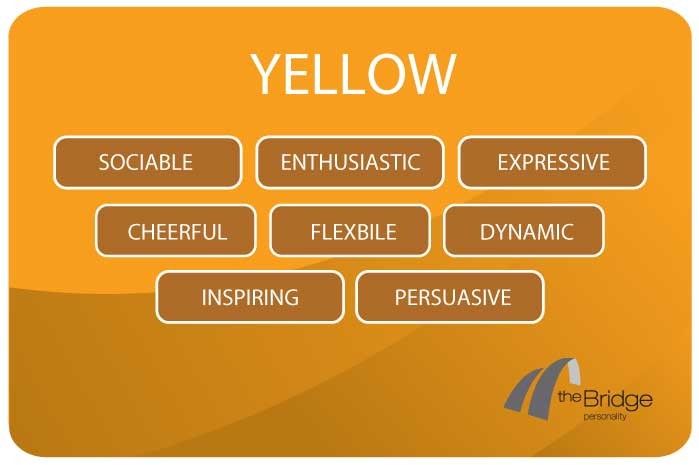What is a yellow personality type?
A yellow personality type reflects a bright, positive behavioral style. Individuals with this personality are enthusiastic, spontaneous, and excel in social environments. They effortlessly connect with others, enjoy nurturing relationships, and love inspiring those around them with their energy and charm.
Yellow types are expressive, utilizing both words and body language to communicate openly. They feel most at ease in dynamic, fast-paced environments where they can take initiative. Quick to generate new ideas, they enjoy involving entire groups in activities. For them, fun and positive social interactions are essential.

The color yellow in the 4-color personality test
For 10 years, The Bridge Personality has been the most widely used 4-color personality test by companies and organizations, requiring no licenses or additional training. It is also very valuable for teams, offering a comprehensive team report. This tool is essential for HR specialists and coaches, easily ordered for individual participants or accessible via an assessment account on our online platform.
The clear and immediately applicable 4-color model (blue, red, yellow, and green) provides insights into people's natural behaviors. This 4-color test is invaluable for improving work performance at the individual, team, and organizational levels, and highlights the unique strengths of your employees.

Are you interested in using a 4-color personality test with your team?
TestGroup offers a Do-It-Yourself team workshop package. It includes a 4-color personality test for all team members, individual reports, a team report, and the team workshop presentation sheets.
What makes someone a yellow personality?
Individuals with a preference for yellow are often energetic and enthusiastic. They enjoy interacting with others and excel at motivating people. Yellow types are typically creative, expressive, and brimming with new ideas. They cherish freedom, spontaneity, and a variety of experiences.
In Surrounded by Idiots, Yellow types are described by author Thomas Erikson as having a charismatic, positive outlook. Erikson says they see life as a series of joyful opportunities and are always eager to try new things. Their driving forces are happiness and laughter. Erikson explains that Hippocrates called this type “sanguine,” meaning “optimist.”
Yellow personalities are lively, entertaining, and often popular. At a party, they’re usually the person in the middle of a laughing crowd. Erikson explains that this person is likely a Yellow type who enjoys telling stories, being in the spotlight, and connecting with everyone. Their upbeat attitude rubs off on others; spending time with a Yellow type can boost your own mood.
While both Yellow and Red personality types are extroverted, Erikson points out that Yellow types are more focused on building relationships and connections, unlike Red types. Yellow personalities can chat with anyone, even strangers, simply for the pleasure of connection. They don’t worry about the outcome of the conversation or its depth—they just enjoy interacting with others.
Like Red types, Yellow personalities enjoy a full, busy schedule. Their curiosity makes them eager to explore everything around them, as they see beauty and excitement in all things. According to Erikson, you could suggest nearly any activity to a Yellow type, and they would likely be thrilled to join.
How to order a 4 color personality test
Ordering a 4 color personality test from TestGroup is straightforward. For occasional needs, order a single test per candidate—ideal for specific hires or small team assessments. If your organization needs regular assessments, choose an unlimited account for ongoing access to as many tests as you need.
How does yellow react to stress?
Under pressure, someone with a yellow personality style can become impatient or impulsive. They may feel overwhelmed by too many details or strict rules. Stress can arise if they feel restricted or don't have the opportunity to express their ideas.
How yellow personality types cope with stress
When Yellow-dominant people feel stressed, they often become even more expressive. They may become extra talkative, overly optimistic, and highly energetic, seeking ways to be the center of attention.
To help a Yellow type manage stress, it can be effective to let them engage in social activities, especially if they get to plan the event. For example, if a Yellow-dominant person is feeling stressed, encourage them to organize a fun team outing to boost morale. The act of planning a social gathering can often relieve their stress.
If the Yellow type is stressed from overcommitment, assigning them a new task might add to their burden. Instead, check in to see if they feel overwhelmed or unstimulated. If overwhelmed, help them prioritize or reduce their workload; if understimulated, suggest planning a social event.
Stress triggers for yellow personality types:
Talking with yellow personalities
To effectively communicate with a yellow person, it's important to be enthusiastic and open. They appreciate a lively and dynamic conversation style. Be flexible and open to their ideas. Avoid being too rigid or formal in your approach.
What drives yellow and what do they fear?
Yellow people are driven by the need for social interaction, fun, and creative expression. They thrive on challenges and aspire to inspire others. However, they dislike too much routine or feeling constrained in their freedom.
Strengths and weaknesses of yellow
The strength of 'yellow' lies in their ability to energize others and think outside the box. However, their weakness can be a lack of focus, or difficulty in completing tasks due to a tendency to be easily distracted.
Yellow in the workplace
IIn the workplace, 'yellow' colleagues often create a positive atmosphere. They are great at brainstorming and can motivate the team. It's important to support their creativity and need for variety. Give them space to innovate and share their ideas. This way, you can fully benefit from the energy and creativity that 'yellow' personalities bring.
Best careers for yellow personality types
People with a "yellow personality" are energetic, sociable, and optimistic. They thrive in creative, interactive, and dynamic environments. Here are some ideal careers:
Yellow personalities succeed in roles that emphasize communication, creativity, and enthusiasm. Choosing a career that matches their passion ensures fulfillment and success.
How to coach people with a yellow personality color
Coaching individuals with a yellow personality can be incredibly rewarding. These individuals are known for their optimism, cheerfulness, and high energy. In personality psychology, the personality color yellow is known as creative and dynamic. They thrive in social settings, enjoy taking on new challenges, and love to keep everyone’s spirits up. Here’s a guide on how to effectively coach people with a yellow personality.
Understanding yellow personalities
People with yellow personalities are naturally extroverted and social. They bring a lot of energy and positivity to any team or group. Their adaptability allows them to adjust quickly to new people and environments, making them excellent team players. Yellow personalities are also highly creative and enjoy using their imagination to solve problems and generate new ideas.
Leveraging the strengths of a yellow personality type
Addressing the weaknesses of yellow personalities
How to coach yellows for job interviews
Yellow personalities shine in social interactions, making them naturals in job interviews. Their extroverted nature and enthusiasm for meeting new people can leave a lasting positive impression on interviewers. They are typically full of ideas and confident in their abilities, which helps them stand out.
However, their tendency to juggle multiple projects can make them appear unfocused. It’s important for Yellows to prioritize the interview process and dedicate their full attention to the opportunity. This focus will demonstrate their commitment and reliability to potential employers. Yellows should leverage their natural confidence during interviews. Confidence signals to interviewers that they believe in their ability to perform the job effectively. This self-assuredness is often key to making a strong case for their suitability for the role.
Reflecting on personal traits and growth
Encourage yellow personalities to reflect on their traits and how they align with their career goals. You can also suggest that they read some coaching tips as a helpful resource. If they find dissatisfaction in their current roles, encourage them to explore how their unique qualities can be better utilized in other career paths. Self-awareness is essential for personal and professional development. If they need further guidance, suggest seeking out a coach or mentor. With support, they can deepen their understanding of their personality and align their strengths with their aspirations.
The Bridge Tests & Online Assessments
TestGroup is the official provider of the renowned Bridge tests and online assessments, which are high-quality, scientifically validated psychometric tools used globally. Developed in collaboration with universities around the world, these assessments predict workplace behavior through personality tests, cognitive ability evaluations, and career assessments. We assist organizations globally in using online assessments.















